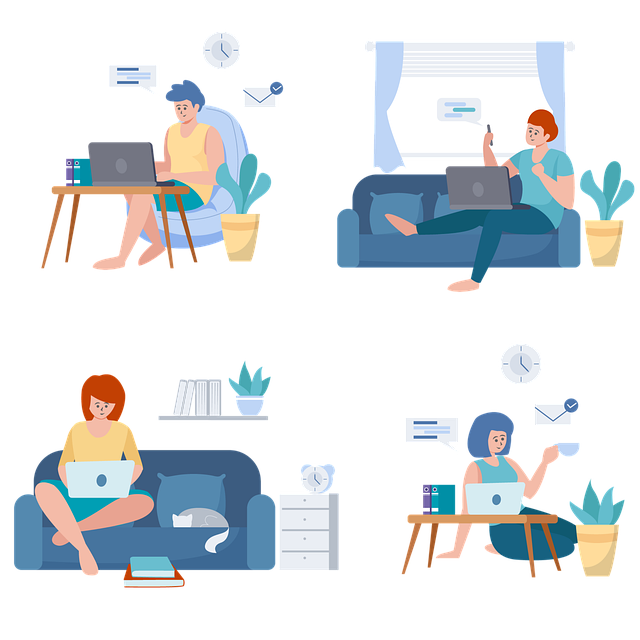Web-based relationship therapy, or couples counseling virtual, is a modern alternative to traditional in-person sessions, removing geographical barriers and offering flexible, accessible support for diverse couples. Utilizing secure video conferencing and messaging platforms, licensed therapists help partners from different locations navigate challenges, improve communication, and develop coping strategies for issues like conflict resolution and emotional intimacy. This innovative approach, leveraging advanced technology, fosters rapport, enhances collaboration, and demonstrates positive results in strengthening relationships, with the potential to revolutionize mental health services.
Discover the future of intimacy with web-based relationship therapy, a digital solution transforming how couples connect. This innovative approach to couples counseling offers unparalleled accessibility, convenience, and privacy. In an era where technology bridges gaps, virtual counseling allows partners to improve communication, resolve conflicts, and strengthen bonds from the comfort of home. Explore the benefits, processes, and success stories that prove online relationship therapy is a powerful tool for modern couples seeking growth.
- Understanding Web-Based Relationship Therapy: An Overview
- Benefits of Virtual Couples Counseling
- The Process and Tools Used in Online Relationship Therapy
- Success Stories and Future Prospects of Digital Therapy for Couples
Understanding Web-Based Relationship Therapy: An Overview

Web-based relationship therapy, also known as virtual or online couples counseling, is a modern approach to addressing relationship issues that leverages digital platforms for sessions. It provides an accessible and convenient alternative to traditional in-person counseling, allowing couples to seek help from the comfort of their homes. This method has gained significant traction in recent years, especially with the rise of remote work and increased acceptance of online services.
In a typical web-based session, couples interact with a therapist through video conferencing tools or secure messaging platforms. The process involves discussing relationship challenges, exploring communication patterns, and learning effective coping strategies. Therapists use evidence-based techniques tailored to various issues, such as conflict resolution, emotional intimacy, and infidelity. By removing geographical barriers, this form of therapy enables couples from diverse locations to access specialized support, fostering healthier relationships regardless of their physical distance.
Benefits of Virtual Couples Counseling

In today’s digital age, web-based relationship therapy, or couples counseling virtual, offers a convenient and accessible solution for many couples seeking support. One of its key advantages is eliminating geographical barriers; couples from different locations can now connect with licensed therapists online, fostering a sense of inclusivity and convenience. This accessibility is particularly beneficial for those in remote areas or with busy schedules who may find it challenging to attend traditional in-person sessions.
Moreover, virtual counseling provides a safe and private space for individuals and couples to open up and discuss sensitive topics without the potential judgments or distractions that can sometimes arise in physical settings. With secure video conferencing platforms, therapists ensure confidentiality, allowing clients to focus on their relationship goals with peace of mind. This modern approach has proven effective for various types of therapy, offering a flexible and comfortable alternative to conventional couples counseling methods.
The Process and Tools Used in Online Relationship Therapy

In the realm of modern mental health services, web-based relationship therapy has emerged as a convenient and accessible option for couples seeking counseling. This innovative approach to couples counseling virtual platforms utilize various tools to facilitate effective communication and support between clients and therapists. Through secure video conferencing software, sessions allow face-to-face interactions, fostering rapport and understanding.
During a typical session, therapists employ evidence-based techniques tailored to the unique needs of each couple. This may include cognitive-behavioral therapy (CBT) methods for identifying and changing negative patterns, or mindfulness practices for improving emotional connection. Additional tools like shared documents, online workbooks, and message boards enhance collaboration by enabling couples to discuss exercises between sessions. Such diverse methodologies ensure a personalized experience, making online relationship therapy a game-changer in accessibility and convenience for those seeking to strengthen their bonds.
Success Stories and Future Prospects of Digital Therapy for Couples

Many couples counseling virtual sessions have yielded positive outcomes, proving that digital therapy is an effective and accessible solution for modern relationships. These success stories range from improving communication and conflict resolution skills to fostering deeper emotional connections and even leading to stronger marriages. The convenience of scheduling sessions at mutually agreeable times and the comfort of conducting them in private homes have contributed to a more inclusive and less stigmatized approach to seeking help.
Looking ahead, the future of digital therapy for couples seems promising with advancements in technology and growing acceptance of virtual healthcare. Improved video conferencing tools can enhance interaction and create a more immersive experience. Additionally, integrating artificial intelligence and data analytics could enable personalized treatment plans and better tracking of progress. As accessibility and effectiveness continue to improve, couples counseling virtual services are poised to play an increasingly significant role in supporting and strengthening relationships across diverse populations.
Web-based relationship therapy, or virtual couples counseling, offers a convenient and accessible solution for couples seeking support. By leveraging digital tools and platforms, this modern approach allows individuals to improve their connections from the comfort of their homes. The benefits are clear: increased flexibility, reduced costs, and enhanced privacy. As technology continues to evolve, online relationship therapy promises to play a significant role in shaping the future of couples counseling, providing an efficient and effective alternative for those seeking healthier relationships.






